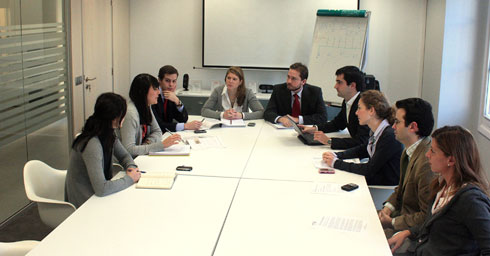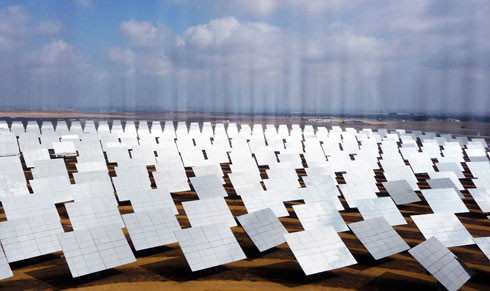 Abengoa
Abengoa
Annual Report 2009
- Activity Report
- Abengoa and Innovation
- Sustainability. Abengoa’s Business Metrics
Sustainability. Abengoa’s Business Metrics
Abengoa today is an international leader in many key areas of the Green Economy. This is where all its business units operate; all their policies and innovation strategies seek to make sustainable use of resources and raw materials so as to harness their entire life cycles. And it is to this end that each Abengoa business unit undertakes its own processes of technological innovation.
Abengoa has pioneered technological innovation in the field of renewable energy sources to offer high energy efficiency and low environmental impact. This realm of technological development, as part of the new Green Economy, leads to savings in greenhouse gas emissions. Furthermore, by decentralizing from conventional sources, renewable energy frees domestic economies from long-standing geopolitical constraints imposed by oil and gas states, and the shortfalls in security of supply that such sources sometimes imply.

The key areas of sustainable development being leaded by Abengoa include:
- Abengoa Solar, which produces energy using solar thermal or photovoltaic sources instead of conventional sources, and develops energy storage technologies. Abengoa owns the only two commercial concentrating solar power plants in the world that use tower technology, and is now developing several parabolic trough plants, including one of the world’s largest in Arizona, USA. Abengoa has gained a clear world lead in this field. The key factor underpinning the company’s leadership is its cooperation with the Almería Solar Platform and with CIEMAT as a whole.
- Abengoa Bioenergy, which produces first and second-generation biofuels to replace conventional fossil fuels. Using biomass as an energy source, Abengoa undertakes research and development projects that are set to mature into commercial enzymatic hydrolysis and biomass gasification facilities and hybrid biomass and concentrating solar power plants.
- Befesa Medio Ambiente provides solutions for the integrated water cycle and the integrated management of industrial wastes, creating new desalination and water treatment plants and new industrial processes for waste reuse.
- Telvent develops smart networks to optimize energy use and grid manageability. The company builds smart networks through research and development projects to create products which are then implemented in different countries around the world. Telvent’s smart, efficient energy distribution networks play a leading role in this domain. Telvent is also developing highly competitive and sustainable agriculture with key support from new technologies. It supplies technology services to the world’s leading farming sector: the United States agriculture.
- Abeinsa’s “New Horizons” business unit comprises the companies Hynergreen and Zeroemissions. Hynergreen develops new systems to produce hydrogen from renewable sources and to use it in state-of-the-art fuel cells. Zeroemissions is a company providing global solutions for climate change through the promotion, development and sale of carbon credits, voluntary emissions set-off arrangements, and innovation in greenhouse gas reduction technologies. Abeinsa also implements energy efficiency improvements, carbon capture and storage programs and ongoing innovation schemes at industrial and energy plants, especially renewable energy facilities.
